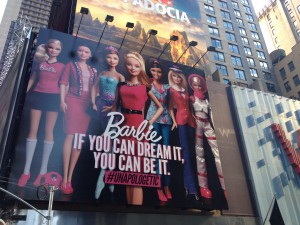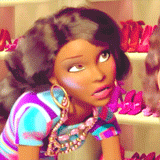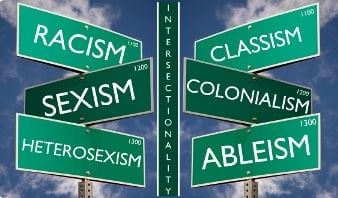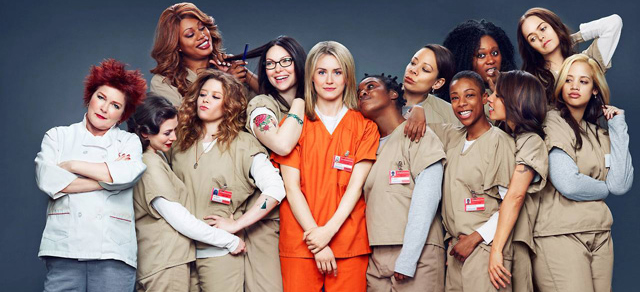I feel like it’s only appropriate to conclude my blog posts of the Moxie Project by talking about my very first introduction to feminism. While my nana, my mother, and my own sense of stubborn teenage rebellion undoubtedly had the most influential impact on my perspective of feminism, I wouldn’t be totally truthful if I said it started with any one of those. No, my first introduction to the very bare basics of feminism came in the very pink, verycontroversial, and very stylish package that is Barbie. 
When I admit this mildly mortifying fact, most people are somewhat surprised that I was one of those girls, especially given my somewhat radical views, but let me explain. To start off, despite being born and raised in Arizona, (the typical response to that being “There are black people in Arizona?!”), whenever I asked for a Barbie or Barbie related item for Christmas or my birthday, my parents somehow managed to get a black doll. Now they’re obviously not without their faults (their bodies being the most obvious one and, hello, you can’t just keep the mold of a white doll, paint it brown, and call it “diversity,” Mattel), but looking back at that small action, I realize that I was lucky enough to not have a sense of self loathing come from a white doll that reinforced the idea that I needed to be blonde and blue eyed in order to be considered physically attractive. Maybe have the proportions of a Victoria’s Secret model and be 7’0″, but at least I wouldn’t be ashamed of who I am. In addition to having a doll that somewhat resembled me, my parents also strongly stressed the more ambitious aspect of Barbie. So while I might have gotten the Dreamhouse, it was accompanied with a poster of all the careers she (again, the black version of the doll) had in her many years of production. That poster sat at a very prominent place in my room and I would spend some time looking at it; one day, four year old me came to the conclusion that, hey, I’m awesome and there’s nothing stopping me from being a nurse or an astronaut or whatever my heart desired and who cared if I was a girl and wore impractical heels doing it? There was no reason for me to be limited to the typical occupations that four and five year old girls are fed by well meaning, but very misguided adults. That somewhat narrow idea drove me to be fairly competitive as a child and enabled me to think outside the box when it came to thinking about what I wanted to be when I grew up. While I’m pretty critical of the doll today, it had a huge impact on my perception of my abilities and just how much I thought I could really accomplish. So what does this trip down the pink brick road have to do with Moxie? Well on my way to one of our outings, I saw this poster in all of the Moxies’ favorite location, Time Square:

The ad says “Barbie: If you can dream it, you can be it. #Unapologetic. ” I almost thought it was a joke until I realized that Mattel would’ve sued by now.
My first reaction was to laugh at how obnoxious Mattel is for being so completely off the mark in addressing the criticisms people have with Barbie. My second reaction was to laugh even harder because they failed to do the most basic job of highlighting their “diversity” by whitewashing the crap out of Barbie’s ethnic friends. But as I thought about what my last post would be, I realized that I could apply it to my Moxie journey in identifying with the label “feminist.”
Coming into the summer, as I settled into my job and started seriously analyzing the readings, one of my unofficial goals was to determine what type of feminist I wanted to be. In the past two years, I’ve struggled to identify with only the label of “feminist.” In conversations with, say, a random Duke student, I would be willing to use the label, but I’ve never felt entirely comfortable with simply the title “feminist.” While the mainstream movement has done some effective change, I feel that, despite getting much better than their second wave predecessors, the present feminist movement doesn’t really give a damn about my identity as a black woman. For example, representation; while the mainstream movement petitions DC and Marvel to have Wonder Women and Black Widow films, I’m forced to find a decent representation of myself in a show that takes place in a women’s federal prison. I’m not reaching for the stars, people, I’d just like to see a character who’s personality trait doesn’t only include finger waving. Even discussions on working women is sorely lacking and has a very narrow concentration on who the mainstream movement is trying to help; it tends to over-focus on the Sheryl Sandbergs and the Marissa Mayers of the world rather than on, say, domestic workers. For example pregnancy discrimination has become a big deal recently, but the conversation often neglects working class women despite, as I learned researching for Legal Momentum, that working class women are more likely to not work during their pregnancy due to harder, less accommodating positions or working in places that aren’t willing to provide adequate help. Additionally, I twitch whenever I hear about the wage gap being $0.77 to a man’s dollar, because that’s true only if you’re a white woman compared to a white man’s dollar (also, I can’t stand the unending “having it all” discussion because working class white women and women of color have had to balance families and working for quite some time, but I digress).

“No, Barbie, my hair is not ‘weaved.'”
As much as I try to rally behind mainstream feminism (hey, something is better than nothing and most of use fight for the same things), I feel like the ad and its oblivious hashtag mirrors my persistent annoyance with the movement. I commend effort and acknowledging when you aren’t the greatest ally; it’s difficult to swallow your on privilege in order to shut up and listen. However, as the summer unfolded, I started to realize that too many visible faces of the movement are entirely unwilling to step aside or even talk about intersectionality and, frankly, I’m out of patience. As a movement, we can’t pat ourselves on the back for moving one step forward because, in the process, we’ve moved three steps back. With Barbie, it’s not enough that she’s introduced a myriad of careers because she still does it in a Eurocentric and thin package. With feminism, it’s not revolution that Lena Dunham is able to be naked on television because she still presents a very narrow narrative. There’s a difference between meeting someone where they are and the meeting lowest common denominator. I’m all for educating people about feminism and meeting people where they are, but I’m not going to support a movement who still considers the default woman to be white, heterosexual, and upper middle class. I am not in the mood to hear about how #unapologetic you are about loving Lily Allen, Iggy Azalea, or the movie Lucy because that just shows that you care about women who are willing to step on marginalized identities. Fun fact: that ambiguous “people of color” group happens to include women and I would appreciate being included in a conversation about representation without it going back to the tired discussion on body image and barely acknowledging the role racialized misogyny plays in Hollywood. I’d like to have a discussion about role that highly sexualized and exoticisized portrayals of women of color and LGBT folks in the media (especially porn) impact sexual assault, fetishization, and abuse.

That was one of the great and unexpected things about Moxie; I wasn’t sure what to anticipate content-wise and I was thrilled that, while Nicole and Ada didn’t chuck us into the deep end, they expected us to step outside our comfort zones and realize that, hey, feminism isn’t just about you. Don’t only focus on the issues that directly impact your identity because that type of individualism doesn’t benefit those who benefit from changes brought by the movement the most. You have to have room to learn, but you cannot do your learning at the expense of someone’s dignity. It’s important to explore the history of how one aspect of your identity has been oppressed, but it’s also important to acknowledge how your privileges can perpetuate oppression. There’s going to be a feeling a guilt, but don’t let it hinder your ability to make change because otherwise, it’s going to do more harm than good. Change isn’t an individual thing, it’s a group effort and if I want to see a change, I should step up when I can, shut up when it’s time to listen, and actually do something outside of talking about what’s wrong with the world. I’ll never disassociate myself from the mainstream movement because while I have criticisms, I am also able to see the good it’s done and continues to do at many different levels. But it’s really important that I’m a part of a movement that is willing to go outside its comfort zone and talk about comfortable truths. As for the feminist I want to be? Well, the list of adjectives describing my political ideology would make this post even longer than it already is, so for now, I think I’ll stick with media-obsessed intersectional black feminist. How’s that for #unapologetic?

 Will it have a huge impact on all people who use birth control? Totally. But will it really affect everyone similarly? God no. The people who were the talking heads about the case are not the same people who will be most impacted by this. The women this ruling does a disservice to are the one who have no choice but to work at the Hobby Lobbys of the world and don’t get the privilege of paying for the Pill or an IUD at a doctors office out of pocket; they have to chose between getting birth control or getting a job. There’s no reason for most of the images about the case to have predominantly white women; a significant portion of women most impacted are working class Latina and black women. And in the same vein of ignoring working class Latina and black women, the justified outrage over the Hobby Lobby decision completely overshadowed the decision on unions the court made on the same day. I’m not going to lie and say I totally understand what happened in
Will it have a huge impact on all people who use birth control? Totally. But will it really affect everyone similarly? God no. The people who were the talking heads about the case are not the same people who will be most impacted by this. The women this ruling does a disservice to are the one who have no choice but to work at the Hobby Lobbys of the world and don’t get the privilege of paying for the Pill or an IUD at a doctors office out of pocket; they have to chose between getting birth control or getting a job. There’s no reason for most of the images about the case to have predominantly white women; a significant portion of women most impacted are working class Latina and black women. And in the same vein of ignoring working class Latina and black women, the justified outrage over the Hobby Lobby decision completely overshadowed the decision on unions the court made on the same day. I’m not going to lie and say I totally understand what happened in 
